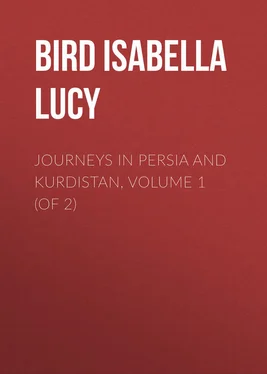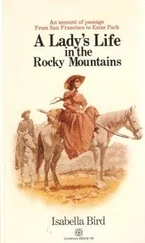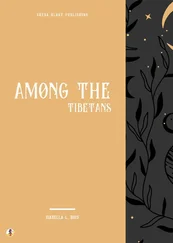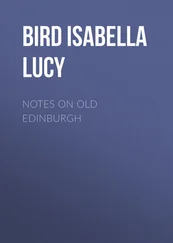Isabella Bird - Journeys in Persia and Kurdistan, Volume 1 (of 2)
Здесь есть возможность читать онлайн «Isabella Bird - Journeys in Persia and Kurdistan, Volume 1 (of 2)» — ознакомительный отрывок электронной книги совершенно бесплатно, а после прочтения отрывка купить полную версию. В некоторых случаях можно слушать аудио, скачать через торрент в формате fb2 и присутствует краткое содержание. ISBN: , Жанр: foreign_language, foreign_antique, foreign_prose, Путешествия и география, на английском языке. Описание произведения, (предисловие) а так же отзывы посетителей доступны на портале библиотеки ЛибКат.
- Название:Journeys in Persia and Kurdistan, Volume 1 (of 2)
- Автор:
- Жанр:
- Год:неизвестен
- ISBN:http://www.gutenberg.org/ebooks/38827
- Рейтинг книги:4 / 5. Голосов: 1
-
Избранное:Добавить в избранное
- Отзывы:
-
Ваша оценка:
- 80
- 1
- 2
- 3
- 4
- 5
Journeys in Persia and Kurdistan, Volume 1 (of 2): краткое содержание, описание и аннотация
Предлагаем к чтению аннотацию, описание, краткое содержание или предисловие (зависит от того, что написал сам автор книги «Journeys in Persia and Kurdistan, Volume 1 (of 2)»). Если вы не нашли необходимую информацию о книге — напишите в комментариях, мы постараемся отыскать её.
Journeys in Persia and Kurdistan, Volume 1 (of 2) — читать онлайн ознакомительный отрывок
Ниже представлен текст книги, разбитый по страницам. Система сохранения места последней прочитанной страницы, позволяет с удобством читать онлайн бесплатно книгу «Journeys in Persia and Kurdistan, Volume 1 (of 2)», без необходимости каждый раз заново искать на чём Вы остановились. Поставьте закладку, и сможете в любой момент перейти на страницу, на которой закончили чтение.
Интервал:
Закладка:
At first it seemed likely that I should fall so low as to occupy one of these, but careful investigation revealed a ruinous stair leading to the roof, up which were two rooms, or shall I say three? – an arched recess such as coals are kept in, a small room within it, and a low wood hole. The open arch, with a mangel or iron pan of charcoal, serves as the "parlour" this January night, M – occupies the wood hole, and I the one room, into which Hadji, with many groans and ejaculations of " Ya Allah! " has brought up the essential parts of my baggage. The evening is gray and threatening, and low, snow-covered hills look grimly over the bare brown plain which lies outside this mournful place.
Khannikin, Jan. 15. – This has been a hard, rough march, but there will be many worse ahead. Rain fell heavily all night, converting the yard into a lake of trampled mud, and seemed so likely to continue that it was difficult to decide whether to march or halt. Miserable it was to see mules standing to be loaded, up to their knees in mud, bales of tents and bedding lying in the quagmire, and the shivering Indian servants up to their knees in the swamp. In rain steadily falling the twelve animals were loaded, and after the usual scrimmage at starting, in which the bakhsheesh is often thrown back at us, we rode out into a sea of deep mud, through which the mules, struggling and floundering, got on about a mile an hour.
After a time we came to gravel, then relapsed into deep alluvial soil, which now means deep mire, then a low range of gravelly hills on which a few sheep and camels were browsing on artemisia and other aromatic herbs gave a temporary respite, then again we floundered through miles of mud, succeeded by miles of gravel and stones. The rain fell in torrents, and there was a cold strong wind to fight against. There was that amount of general unpropitiousness which is highly stimulating and inspiriting.
When noon came, there was not a rock or bush for shelter, and turning our backs to the storm we ate our lunch in our saddles. There was nothing to look at but brown gravel, or brown mud, brooded over by a gray mist. So we tramped on, hour after hour, in single file, the zaptieh leading, everything but his gun muffled in his brown abba , splashing through mud and water, the water pouring from my hat and cloak, the six woollen thicknesses of my mask dripping, seeing neither villages nor caravans, for caravans of goods do not travel in such rain as this. Then over a slope we went down into a lake of mud, where the aide-de-camp of the Governor of Khannikin, in a fez and military frock-coat and trousers, with a number of Bashi Bazouks or irregulars, met M – with courtesies and an invitation.
From the top of the next slope there was a view of Khannikin, a considerable-looking town among groves of palms and other trees. Then came a worse sea of mud, and a rudely cobbled causeway, so horrible that it diverted us back into the mud, which was so bottomless that it drove us back to the causeway, and the causeway back to the mud, the rain all the time coming down in sheets. This causeway, without improvement, is carried through Khannikin, a town with narrow blind alleys, upon which foul courtyards open, often so foul as to render the recent ravages of cholera (if science speaks truly) a matter of necessity. The mud and water in these alleys was up to the knees of the mules. Not a creature was in the streets. No amount of curiosity, even regarding the rare sight of a Frank woman, could make people face the storm in flimsy cotton clothes.
Where the road turns to the bridge a line of irregular infantry was drawn up, poorly dressed, soaked creatures, standing in chilly mud up to their ankles, in soaked boots reaching to their knees. These joined and headed the cavalcade, and I fell humbly in the rear. Poor fellows! To keep step was impossible when it was hard work to drag their feet out of the mire, and they carried their rifles anyhow. It was a grotesque procession. A trim officer, forlorn infantry, wild-looking Bashi Bazouks, Europeans in stout mackintoshes splashed with mud from head to foot, mules rolling under their bespattered loads, and a posse of servants and orderlies crouching on the top of baggage, muffled up to the eyes, the asses which carry the katirgis and their equipments far behind, staggering and nearly done up, for the march of seventeen miles had taken eight and a half hours.
An abrupt turn in the causeway leads to the Holwan, a tributary of the Diyalah, a broad, rapid stream, over which the enterprise of a Persian has thrown a really fine brick bridge of thirteen heavily-buttressed arches, which connects the two parts of the town and gives some dignity and picturesqueness to what would otherwise be mean. On the left bank of the Holwan are the barracks, the governor's house, some large caravanserais, the Custom-house, and a quarantine station, quarantine having just been imposed on all arrivals from Persia, giving travel and commerce a decided check.
After half a mile of slush on the river bank we entered by a handsome gateway a nearly flooded courtyard, and the Governor's house hospitably engorged the whole party.
The fully-laden mules stuck in the mud a few miles off, and did not come in for two hours, and in spite of covers everything not done up in waterproof was very wet. The servants looked most miserable, and complained of chills and rheumatism, and one of the orderlies is really ill. We cannot move till the storm is over.
The rain falls heavily still, the river is rising, the alleys are two feet deep in slush, travel is absolutely suspended, and it is not possible without necessity to go out. It was well indeed that we decided to leave the shelterless shelter of Kizil Robat. Nothing can exceed the wretchedness of Khannikin or any Turkish town in such rain as this. Would that one could think that it would be washed, but as there are no channels to carry off the water it simply lodges and stagnates in every depression, and all the accumulations of summer refuse slide into these abominable pools, and the foul dust, a foot deep, becomes mud far deeper; buried things are half uncovered; torrents, not to be avoided, pour from every roof, the courtyards are knee-deep in mud, the cows stand disconsolately in mud; not a woman is to be seen, the few men driven forth by the merciless exigences of business show nothing but one eye, and with "loins girded" and big staffs move wearily, stumbling and plunging in the mire.
After some hours the flat mud roofs begin to leak, water finds out every weak place in the walls, the bazars, only half open for a short time in the day, are deserted by buyers, and the patient sellers crouch over mangels , muffled up in sheepskins, the caravanserais are crammed and quarrelsome; the price of fodder and fuel rises, and every one is drowned in rain and wretchedness. Even here, owing to the scarcity of fuel, nothing can be dried; the servants in their damp clothes come in steaming; Hadji in his misshapen "jack-boots," which he asserts he cannot take off, spreads fresh mud over the carpets whenever he enters; I shift from place to place to avoid the drip from the roof – and still the rain comes down with unabated vigour!
LETTER III ( Continued )
The house consists of two courtyards, with buildings round them. The larger and handsomer is the haram or women's house, which is strictly enclosed, has no exterior windows, and its one door into the men's house is guarded by a very ancient eunuch. The courtyard of this house is surrounded partly by arched serdabs , with green lattice fronts, and partly by a kitchen, bakery, wood-house, hammam or hot bath, and the servants' quarters. The haram has a similar arrangement on the lower floor. A broad balcony, reached by a steep and narrow stair, runs round three sides of the upper part of this house. There are very few rooms, and some of them are used for storing fruit. The wet baggage is mostly up here, and under the deep roof the servants and orderlies camp, looking miserable. The haram has a balcony all round it, on which a number of reception and living rooms open, and though not grand or elaborately decorated, is convenient and comfortable.
Читать дальшеИнтервал:
Закладка:
Похожие книги на «Journeys in Persia and Kurdistan, Volume 1 (of 2)»
Представляем Вашему вниманию похожие книги на «Journeys in Persia and Kurdistan, Volume 1 (of 2)» списком для выбора. Мы отобрали схожую по названию и смыслу литературу в надежде предоставить читателям больше вариантов отыскать новые, интересные, ещё непрочитанные произведения.
Обсуждение, отзывы о книге «Journeys in Persia and Kurdistan, Volume 1 (of 2)» и просто собственные мнения читателей. Оставьте ваши комментарии, напишите, что Вы думаете о произведении, его смысле или главных героях. Укажите что конкретно понравилось, а что нет, и почему Вы так считаете.












